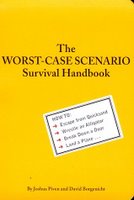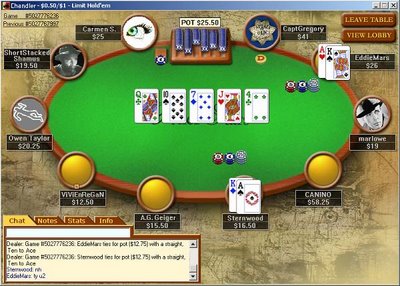Everyone knows about the "Hammer" (72 offsuit). However, when 73 offsuit became the hand that won $7.5 million last July, the quickly-anointed “Hachem” emerged as a new favorite for sneaks looking for ways to send opponents tiltward by cracking their premium holdings with obvious trash.
Not too long ago, I was in a game of six-handed limit hold ’em ($0.50/$1) when a mostly-tight player, Archer, opened with a preflop raise from the cutoff. The button and SB folded to me in the BB where I’d been dealt said Hachem. Now I’m a reasonable fellow. Not too bright, mind you, but reasonable. And it was the not-too-bright part that had me hesitating, oddly contemplating putting in the dollar to call.
Now there are a few sad sacks who hate hate hate to give up their blinds, no matter how unreasonable a defense appears to be. Not I, said the fly. I’ll happily donate my cabbage when such obvious weakness warrants doing so. For some reason, though -- perhaps just “to stir things up,” as Hammett’s Op might say -- I broke routine and made the call.
In a December 2005 CardPlayer column on “Defending Blinds,” Matt Matros notes how in heads-up situations such as the one I faced, one can be marginally more liberal with the calls, although one must be cognizant of other factors as well. One does get 3.5-to-1 to call here, with $1.75 already in the pot awaiting my additional $0.50 to make a flop happen. And, as Matros points out, one can virtually guarantee a postflop continuation bet from the raiser, thus, in a sense, making the odds 4.5-to-1. However, as Matros also explains, opening raises from the cutoff generally mean more strength than do button raises. The opponent’s tendencies (as far as one has a line on them) are essential to consider as well.
Of these three pieces of advice, then, only one (the first) could possibly be twisted into something resembling a recommendation to call. In other words, I’d crawled out on this limb all by myself, and yes I was more than vaguely aware what I looked like out there.
But there I was. And there was the flop. A real looker, in fact. Ace-seven-trey, all different suits. I check-raised Archer who after a bewildered pause called. Two more crying calls and I’d scooped an $8 pot when my two pair bested Archer’s ace-queen.
Now the gist of this here parable ain’t to supply the world with yet another example of the cold unfairness of our existence. Nor is it to prove any sort of special prescience at the table for your humble whatever. Rather, the crux of the matter is in what came next, when a suddenly-vocal Archer fumes to no one in particular
Archer: who calls a raise with 7 3? A reasonable question, to be sure. No one at the table rushed to offer our crestfallen comrade any assistance with his query. So Archer tried again:
Archer: wtf
Archer: u r one lucky FISHHHH
Archer: ****erAnd so forth. Within 40-50 hands, Archer’s once handsome stack of $35 had been reduced to $11 when one player after another pushed him off pots and/or showed down two pair, trips, straights, and flushes to his unfortunate run of second-best hands. As for me, I mostly stayed on the sideline, paring my fingernails and whistling, unable to take any real advantage of the new table image I seemed to have created for myself.
Although Archer may well have loosened up his starting hand requirements somewhat (e.g., limping from UTG w/A7o, etc.), I wouldn’t describe his subsequent play as overtly tiltish. And while his temporary slide certainly involved some more bad luck, it nevertheless appeared that everyone at the table had become suddenly able to take advantage, suddenly able to know when to reraise him, when to show down hands against him, when to fold to him. Archer had become an “open book,” so to speak. I wondered if perhaps a principle of poker might be hidden somewhere in the machinations I was witnessing. Something along the lines of
WITH EVERY COMPLAINT ABOUT OTHERS’ PLAY, YOU ANNOUNCE TO THE TABLE SOMETHING ABOUT YOUR OWN.By articulating his frustration at having been called and beaten with 73o, Archer effectively broadcasted to everyone his own tendency to play “by the book” (and, even more significantly, his yearning for others to do the same). Indeed, his complaints communicated this message much more explicitly than did his play in the actual hand, which, if one had paid attention, might well have seemed unorthodox (calling down two more big bets after a check-raise to a board with no obvious draws). Such is a consequence of which “table coaches” don’t always seem aware.
The moral? You should know I don’t go in for morals very much. Let’s just say defend your blind with seven-trey only on special occasions. When heads-up in the WSOP main event, for instance. And think twice before complaining when someone else does.
Labels: *shots in the dark, Barry Tanenbaum, CardPlayer, Continental Op, Dashiell Hammett, Joe Hachem, limit hold'em, Matt Matros
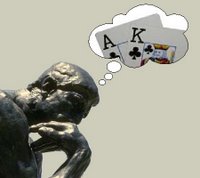
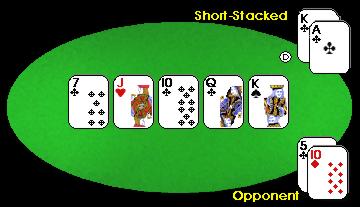
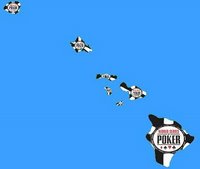
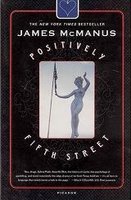
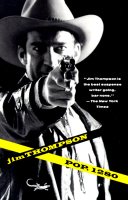


 in late position. The blinds were 100/200. The UTG made a min. raise to 400 and it folded around to me. I thought about the reraise, then decided to play it safe and smooth call. The remaining players all folded, and the flop came
in late position. The blinds were 100/200. The UTG made a min. raise to 400 and it folded around to me. I thought about the reraise, then decided to play it safe and smooth call. The remaining players all folded, and the flop came 

 . The UTG promptly made a healthy bet of 1200 chips (just over the size of the pot). With absolutely no evidence to support the theory that he was making some sort of play with overcards, I somehow surmised he was and put in 3000, effectively committing myself to the pot. Having me well-covered, he reraised all-in and I made my second (or third) error of the hand and called to see his
. The UTG promptly made a healthy bet of 1200 chips (just over the size of the pot). With absolutely no evidence to support the theory that he was making some sort of play with overcards, I somehow surmised he was and put in 3000, effectively committing myself to the pot. Having me well-covered, he reraised all-in and I made my second (or third) error of the hand and called to see his 
 . There were no undeserved miracles on the turn or river, and it was the bum’s rush for me.
. There were no undeserved miracles on the turn or river, and it was the bum’s rush for me.